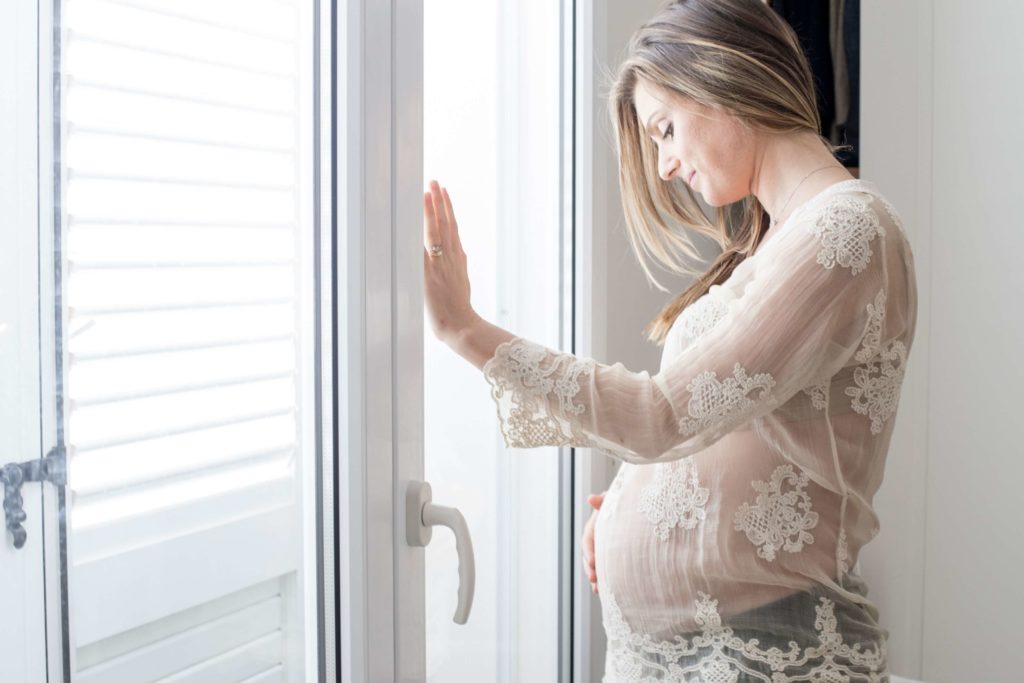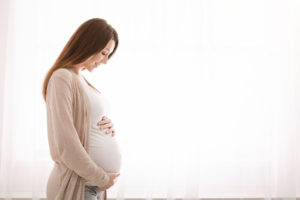Caffeine during pregnancy is something all pregnant moms-to-be need to know about. When you’ve been up to go to the bathroom five times at night, a hot cup of joe in the morning sounds like just the thing. But can you drink coffee while pregnant? How much is too much? We’ve got all the coffee pregnancy facts you need below.
Why Is Coffee and Pregnancy an Issue?
Coffee contains caffeine, a powerful stimulant. That’s why we love it because it makes us feel like we have more energy and blocks the chemicals in our brain that makes us feel sleepy. During pregnancy, the body is slower at processing caffeine, which means it hangs around for longer. This can cause problems for both mom and baby.
Caffeine is a diuretic, which means it makes you pee more than usual. This is a contributing factor towards feeling dehydrated, which is bad news during pregnancy when you need more water than ever. Dehydration also leads to dry and dull skin, irritability, and can affect the immune system.
Although the stimulating effect of caffeine is why we love our coffee, this is also bad news during pregnancy. Caffeine can raise blood pressure. Very high blood pressure can lead to conditions like pre-eclampsia. Caffeine also makes the heart rate, which puts press stress on you and your unborn baby.
Caffeine Pregnancy Facts
- Caffeine can pass through the placenta to your baby.
- Your baby can’t withstand the same amounts of caffeine as you can.
- Caffeine may disrupt your and baby’s sleep patterns.
- Caffeine is in more food and drinks than coffee.
- Caffeine in pregnancy may cause premature labor.
- Caffeine may increase the risk of a miscarriage.
So, Can I Drink Coffee While Pregnant?

Coffee during pregnancy can cause problems, but only over certain amounts. A range of studies come to differing conclusions. Some say less than 150mg caffeine a day is fine; others say 200mg or less. When working out how much caffeine your taking in every day, remember that caffeine is in more than just coffee- see our helpful list below.
How Much Caffeine When Pregnant Is Safe?
Understanding how much caffeine a pregnant woman can have is about looking at the most recent studies we have on the subject. A British study concluded that over 200mg of coffee could seriously increase the risk of fetal growth restriction. The World Health Organization recommends that women who take in more than 300mg a day should lower this during pregnancy, and it’s a good idea to do this if trying for a baby too.
Enjoying a coffee while pregnant is still possible. The problems with pregnancy and caffeine tend to occur when the regular daily intake is consistently high. So, how much caffeine can a pregnant woman have? The best recommendation is no more than 200mg daily, and the less, the better. Remember that caffeine comes from more than just coffee and can also be found in:
- Chocolate
- Soda
- Energy drinks (avoid these when pregnant)
- Some candy
- Tea
- Certain medications
Here are some approximate caffeine amounts for favorite drinks, courtesy of the Mayo Clinic:
8 oz brewed coffee: up to 165mg caffeine
Espresso: up to 47mg
8oz instant coffee: 63mg
8oz latte or mocha: up to 126mg
8oz black tea: up to 48mg
8oz green tea: up to 29mg
8oz cola: up to 46mg
Coffee Alternatives
Can pregnant women drink coffee? Sure, but from the caffeine amounts shown above, only around one cup a day. We know that’s tough, so here are some alternatives to help you get your hot drink fix:
- Decaf Coffee- still has caffeine in but only around 5mg per 8oz
- Tea- a standard black tea has about a quarter the caffeine of coffee
- Decaf Tea
- Redbush Tea, also called Rooibos Tea- a South African herbal drink, which may help with nausea and doesn’t contain caffeine; however, speak to a doctor before taking any herbal drinks or supplements.
- Peppermint Tea – also be good for nausea
- Ginger Tea- good for nausea and has a comforting, warming effect
Don’t fall into the trap of thinking all herbal teas are great. For example, anything with raspberry in it should be avoided as a raspberry leaf can cause uterine contractions. It’s so powerful that your doctor may recommend this at the very end of your pregnancy to help things along. Aloe vera can also have this effect, which is why it’s crucial to talk to a doctor before taking any herbal remedies or teas while pregnant.
Is It Safe to Quit Caffeine?

The best option for both mom and baby is to cut out as much caffeine as possible. But is it safe to go cold turkey? Potential side effects of quitting caffeine include:
- Headache due to increased blood flow
- Tiredness
- Lack of focus
- Low mood
- Anxiety
- Shakes
As a pregnant mom-to-be, you might have some of these symptoms anyway- particularly the tiredness! However, to avoid these, simply cut down your caffeine intake before quitting. Go from a large coffee to a small, and then if you want to quit completely, the effects will be much less. These effects all pass after a few days.
Drinking coffee when pregnant is okay in moderation, although experts can’t agree how much is too much. If you’re worried, switch to decaf or a low caffeine option. Whatever you choose to do, make sure you’re drinking plenty of water and eating healthily.
Takeaway: Can you drink coffee when pregnant? Drinking too much coffee while pregnant can mean you’re taking in high amounts of caffeine. High amounts of caffeine during pregnancy can cause problems for both mother and baby.

